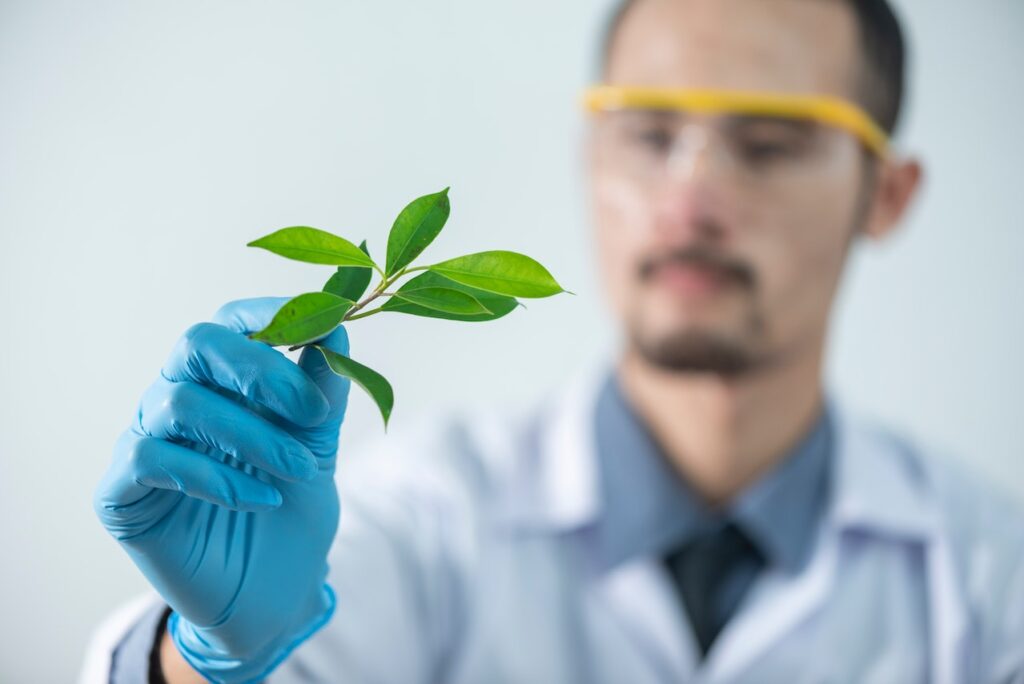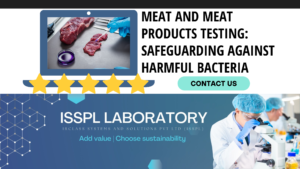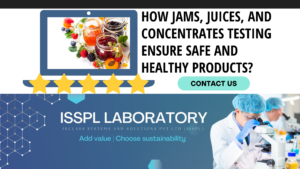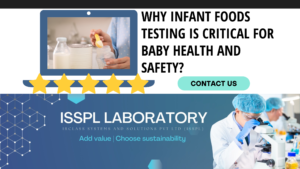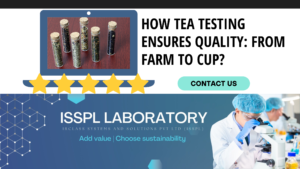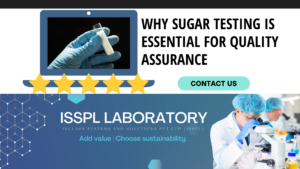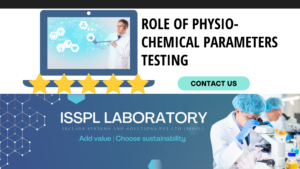Analytical Testing Laboratory in India | ISSPL Testing Lab
IRCLASS Systems and Solutions Pvt Ltd (ISSPL) laboratory is one of the leading analytical testing service providers in India, providing solutions across diverse industries.
IRClass Systems and Solutions Pvt Ltd (ISSPL) announces acquisition of test laboratory
IRClass Systems and Solutions Pvt Ltd (ISSPL), an entity promoted by Indian Register of Shipping, has acquired several verticals of CEG Test House including Food & Agriculture, Pharmaceutical, AYUSH and Environmental Testing.
IRCLASS Systems and Solutions Pvt Ltd (ISSPL Lab) is one of the leading analytical testing service providers in India.
ISSPL Lab offer a comprehensive & diverse range of analytical services to its large clientele that includes Leading corporate houses, exporter, traders, govt. & public sector organizations, and medium and small-scale enterprises across diverse industries and companies both in India and abroad.
ISSPL Testing Laboratory in India
ISSPL Testing Laboratory in Adajan, Surat, Gujarat 395009
IRCLASS Systems and Solutions Pvt. Ltd (ISSPL) announces acquisition of test laboratory.
Related searches, irclass systems and solutions pvt ltd mumbai, irclass systems and solutions salary, irclass systems and solutions jaipur, irclass certificate verification, irclass lab, irqs reviews, irclass systems and solutions pvt. ltd careers, irclass systems and solutions pvt. ltd reviews
Top Analytical Laboratories in India
Cities we cater Lab Testing Servives in India: Analytical Testing Laboratory in Gurugram, Analytical Testing Laboratory in Haryana, Analytical Testing Laboratory in Panaji, Analytical Testing Laboratory in Goa, Analytical Testing Laboratory in Madurai, Analytical Testing Laboratory in Mysore, Analytical Testing Laboratory in Karnataka, Analytical Testing Laboratory in Amritsar, Analytical Testing Laboratory in Punjab, Analytical Testing Laboratory in Jaisalmer, Analytical Testing Laboratory in Rajasthan, Analytical Testing Laboratory in Hyderabad, Analytical Testing Laboratory in Telangana, Analytical Testing Laboratory in Pune, Analytical Testing Laboratory in Maharashtra, Analytical Testing Laboratory in Udaipur, Analytical Testing Laboratory in Rajasthan, Analytical Testing Laboratory in Chennai, Analytical Testing Laboratory in Tamil Nadu, Analytical Testing Laboratory in Kochi, Analytical Testing Laboratory in Kerala, Analytical Testing Laboratory in Varanasi, Analytical Testing Laboratory in Uttar Pradesh, Analytical Testing Laboratory in Kolkata, Analytical Testing Laboratory in West Bengal, Analytical Testing Laboratory in Bangalore,Analytical Testing Laboratory in Karnataka, Analytical Testing Laboratory in Agra, Analytical Testing Laboratory in Uttar Pradesh, Analytical Testing Laboratory in Mumbai, Analytical Testing Laboratory in Navi Mumbai, Analytical Testing Laboratory in Thane, Analytical Testing Laboratory in Kalyan, Analytical Testing Laboratory in Maharashtra, Analytical Testing Laboratory in Jaipur, Analytical Testing Laboratory in Rajasthan, Analytical Testing Laboratory in Delhi
Top Analytical Laboratories in Mumbai - एनालिटिकल लैबोरेट्रीज, मुंबई near me
Analytical Laboratories in Mumbai. Find ✓Laboratory Testing Services For Water, ✓Laboratory Testing For Chemicals, ✓Laboratory Testing Services, ✓Laboratory Testing For Food, ✓Testing Laboratories in Mumbai. Get Phone Numbers, Address, Reviews, Photos, Maps , FAQs for top Analytical Laboratories near me in Mumbai
Analytical Testing Laboratories Manufacturer, Supplier, Exporter in Mumbai
Buy Analytical Testing Laboratories at Best Price, Analytical Testing Laboratories Manufacturer, Supplier, Exporter in Mumbai
What is analytical laboratory testing?
Analytical testing—known as materials testing—involves using skilled techniques to identify the characteristics of a chemical sample. Common applications include the assurance of safety and quality of food, water, and pharmaceuticals, alongside the provision of precise measurements and documentation.
What is the purpose of analytical laboratory?
Analytical laboratories exist to offer leading services that quickly and correctly classify, identify, analyze, and measure samples.
Which thing can be performed in analytical laboratory?
We apply chromatography, spectroscopy, mass spectrometry, microscopy, particle size techniques, physical characterization, physicochemical methods, surface analysis techniques to wide range of chemical testing & analysis applications.
ISSPL Lab is a leading provider of independent analytical laboratory testing services, from advanced R& D research projects to routine quality tests.
Analytical testing—known as materials testing—involves using skilled techniques to identify the characteristics of a chemical sample.
ISSPL Lab is one of the foremost analytical testing labs in India, providing solutions across diverse industries
Keytags : Testing Laboratory in India | Testing Laboratory in Delhi NCR | Top Testing Laboratories in India | Top Testing Laboratory in Delhi NCR | Economical Testing Labs | Economical Testing Laboratories | Best Testing Laboratory in Delhi NCR | Best Testing Laboratory in India | Economical Testing Laboratory in India
Testing & Analytical Laboratory - NABL, BIS, FSSAI Approved in India
Why is analytical testing important?
“Analytical testing is required at all phases of development, and it is critical that this support is accurate and efficient,” says Eric J. Hill, MS, MBA, President, Impact Analytical. “It is used to verify drug chemistry, and therefore can be a barrier to moving to the next phase in the development process.”
Top Testing Laboratory in India
Cities we cater Lab Testing Servives in India: Accredited Testing Lab Near Gurugram, Accredited Testing Lab Near Haryana, Accredited Testing Lab Near Panaji, Accredited Testing Lab Near Goa, Accredited Testing Lab Near Madurai, Accredited Testing Lab Near Mysore, Accredited Testing Lab Near Karnataka, Accredited Testing Lab Near Amritsar, Accredited Testing Lab Near Punjab, Accredited Testing Lab Near Jaisalmer, Accredited Testing Lab Near Rajasthan, Accredited Testing Lab Near Hyderabad, Accredited Testing Lab Near Telangana, Accredited Testing Lab Near Pune, Accredited Testing Lab Near Maharashtra, Accredited Testing Lab Near Udaipur, Accredited Testing Lab Near Rajasthan, Accredited Testing Lab Near Chennai, Accredited Testing Lab Near Tamil Nadu, Accredited Testing Lab Near Kochi, Accredited Testing Lab Near Kerala, Accredited Testing Lab Near Varanasi, Accredited Testing Lab Near Uttar Pradesh, Accredited Testing Lab Near Kolkata, Accredited Testing Lab Near West Bengal, Accredited Testing Lab Near Bangalore,Accredited Testing Lab Near Karnataka, Accredited Testing Lab Near Agra, Accredited Testing Lab Near Uttar Pradesh, Accredited Testing Lab Near Mumbai, Accredited Testing Lab Near Navi Mumbai, Accredited Testing Lab Near Thane, Accredited Testing Lab Near Kalyan, Accredited Testing Lab Near Maharashtra, Accredited Testing Lab Near Jaipur, Accredited Testing Lab Near Rajasthan, Accredited Testing Lab Near Delhi
All Lab Testing Services in India: Alcoholic Beverages Testing, analytical testing laboratory, Animal Nutrition Supplements Testing, Antibiotic Residues Testing, Antioxidants Testing, ayurvedic medicines testing labs, ayurvedic product testing lab, ayurvedic testing lab, Bakery Products Testing, Bakery and Confectionery Products Testing, benefits of soil testing for farmers, Beverages Testing, Canned Food Testing, Capsules Testing, Cereal Products Testing, Cereals Pulses and Cereal Products Testing, Clays and Soils Testing, Clean Room Validation, Cocoa Products Testing, Coffee Products Testing, Compliance Monitoring and Baseline Study, Compressed Air Testing, Continuous Emission Monitoring System Audit CEMS Validation and Emission, Demineralised Water Testing, Dioxins and Furans Testing, Distilled Water Testing, Drinking Water Testing, Ear Drops Testing, Edible Colours and Flavours Testing, Edible Oils and Fats Testing, Egg Products Testing, Eggs and Egg Products Testing, Electrical Safety Audit, environmental monitoring testing, Eye Drops Testing, farm to fork concept food safety, Fish and Sea Foods Testing, Food Additives and Preservatives Testing, Food Additives Testing, Food Grade Packaging Material Testing, food quality testing, food testing lab in india, Fruit and Fruit Products Testing, Gelatin and Other Gums Testing, Ground Water Testing, Halides and Halogens Testing in Stack Emission, Hazardous waste Testing, Heavy Metals Testing, herbal products testing lab, Herbal Testing Services, Herbs Spices Condiments Testing, Honey Products Testing, Honey Testing, Impurity Testing, Indoor and Work Place Air Quality Monitoring, Industrial Hygiene Study, Infant Foods Testing, Injections Testing, Irrigation Water Testing, ISSPL laboratory, Jams Juices and Concentrates Testing, Leak Detection and Repair Testing, Meat and Meat Products Testing, Melamine Testing, Microbiological Testing, Milk and dairy products Testing, Mine Water Testing, Mycotoxin Analysis Testing, Mycotoxins Testing, Nitrogen and Other Industrial Gas Analysis, non Alcoholic Beverages Testing, NOTS Testing, Nut Products Testing, Nutritional Analysis Testing, Nuts and Nut Products Testing, Oil Cake Testing, Oil Seeds and by products Testing, Ointment Testing, Packaged Drinking Water Testing, Packaged Natural Mineral Water Testing, Performance Guarantee and Evaluation Test, Pesticide Residues Testing, pharmaceutical testing laboratories in india, pharmaceutical testing laboratory, Physicochemical Testing, Physio Chemical Parameters Testing, Preservatives Testing, Processed Food Testing, processed foods testing, Sea Foods Testing, Shelf Life and Stability Studies Testing, Snacks and Instant Mixes Testing, Snacks Testing, Soil Testing, soil testing benefits, Sugar and Sugar Products Testing, Surface Water Testing, Surgical insturments testing, Surgical Items testing, Suspension Testing, Swimming Pool Water Testing, Syrup Testing, Tablets Testing, Tea Testing, Tobacco and Tobacco Products Testing, Tobacco Products Testing, Vegetables and Vegetable Products Testing, Vegetables Products Testing, Verification of CO2 emissions, Waste water Testing, Water audit, Water Testing